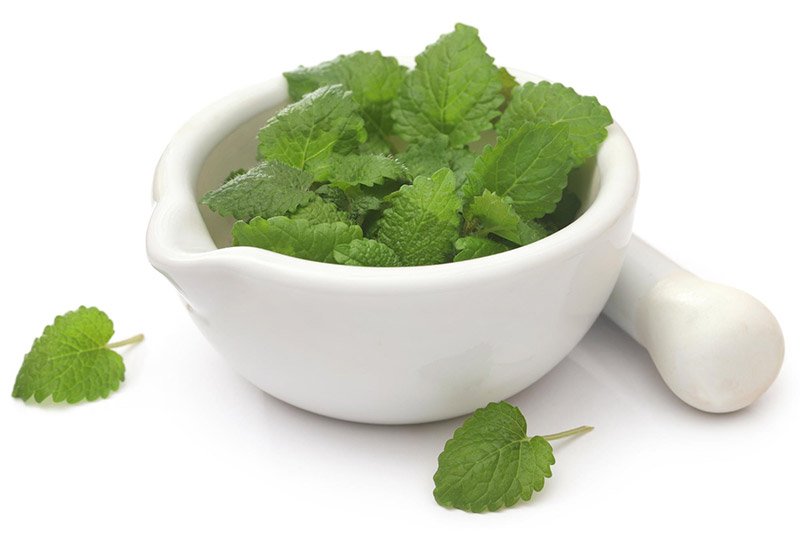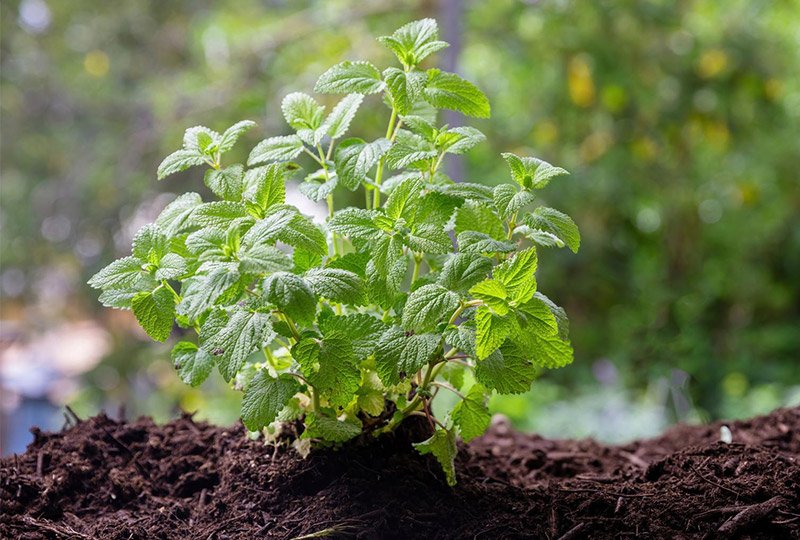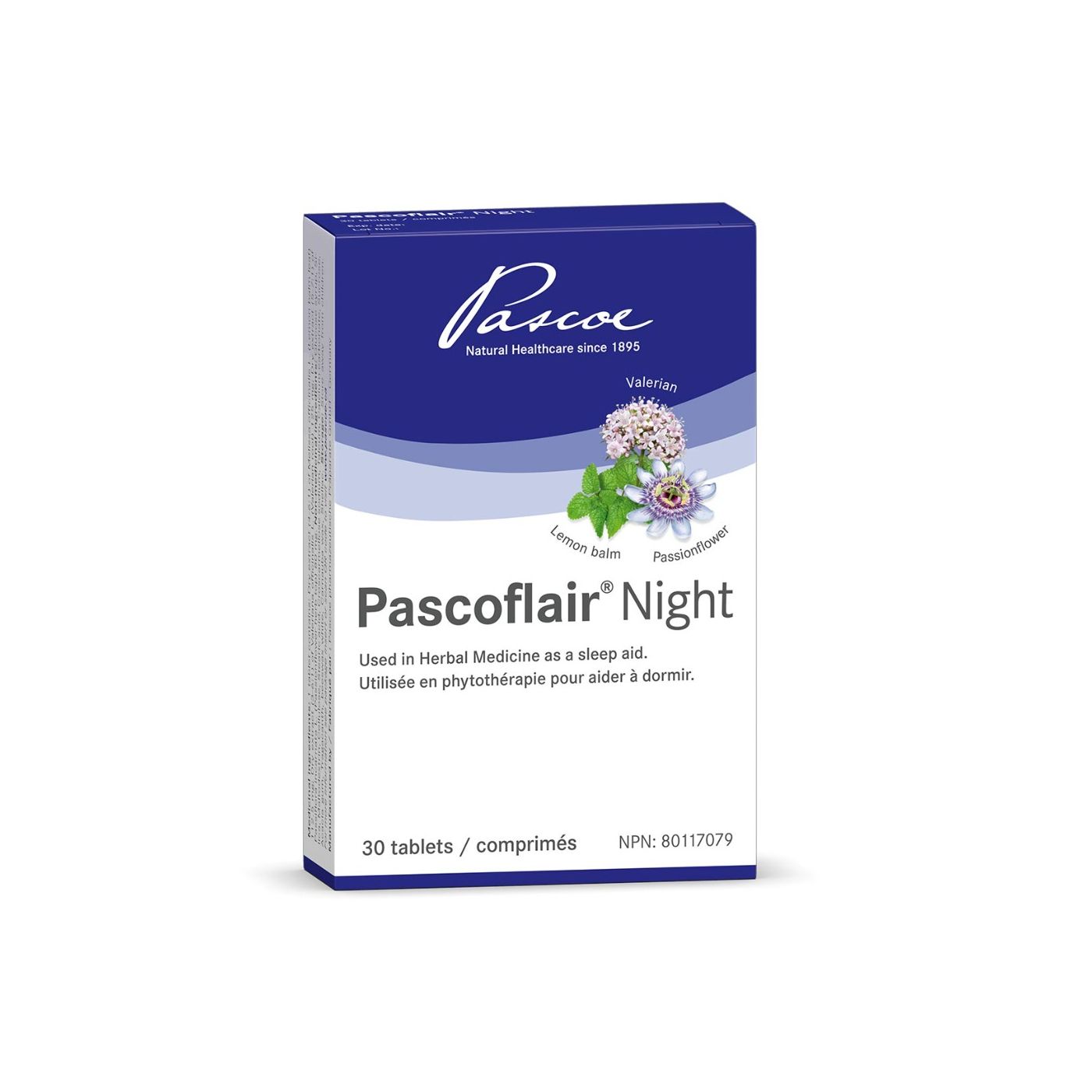

Lemon Balm (Melissa officinalis)
Melissa officinalis or lemon balm is a well-known aromatic herb. The plant is often found in the kitchen as a culinary herb. Its fresh or dried leaves can be prepared as lemon balm tea. Melissa also has a long history of medicinal use that can be dated back to the Greeks and Romans.
In ancient times, the herb was used to lift the spirits, help with wound healing, and for bites and stings. In the Middle Ages, people used lemon balm for sleep, to reduce stress, and for indigestion.
While the herb has long been used as a mood enhancer, more recent research found that it may also help with cognitive function. The calming herb is also often combined with other soothing herbs such as valerian, passionflower, chamomile, and hops.
For its nice scent, the essential oil is used in aromatherapy and perfumes. It has also been found to reduce viruses. This makes it an effective treatment for cold sores.
Many people grow lemon balm in potting soil or as ground cover in their backyard. The bushy herb grows fast in moist soils and in partial to full sun.
Origin and types
The genus Melissa belongs to the mint family Lamiaceae. It is very small with only four species.
The best known and most used species of the four is Melissa Officinalis. The lemon-scented herb is native to the Mediterranean region and Northern Africa. However, it is now grown in many temperate places all over the world.
M. officinalis or lemon balm is used in cooking, cosmetics, and herbal medicine. It is considered a calming herb and is also known as simply ‘balm’ or ‘melissa’.
Another common name for M. officinalis is bee balm. However, bee balm and lemon balm are different plants and should not be confused. They are both members of the mint family but look very different. While bee balm or Monarda has showy red or pink flowers, lemon balm flowers are tiny and white.
What does the plant look like?
The lemon balm plant looks somewhat similar to mint. It grows as a bushy herb up to 60 to sometimes 80 cm tall. It has a square-shaped stem, as all mint plants do.
Its green leaves grow in opposite pairs. They are broadly oval to heart-shaped with edges that look like rounded teeth. Their veins are very prominent and the leaf underside is slightly hairy. Especially when crushed or rubbed, the leaves have a pleasant lemon smell.
Small whitish flowers bloom from June to September and attract bees. The perennial plants produce a lot of tiny seeds. They often self-seed and spread very easily, sometimes overtaking the garden if allowed to go unchecked.
The aromatic leaves should be best harvested before or at the time of blooming. They can be used fresh or dried. However, the dried herb quickly loses a lot of its flavour.


Where does the name come from?
The genus name Melissa is derived from the Greek word for bee. Most likely, this refers to the fact that the flowers are a rich nectar source that attracts many bees.
The species name officinalis points to the plant’s use as a herbal remedy. It suggests that the herb was sold in an “opificina”, the old name for a pharmacy or herb store.
Melissa as a medicinal plant
The leaves of the plant have long since been used for the calming effects of lemon balm. This traditional use is also backed up by modern research.
Several studies showed that lemon balm helped reduce anxiety and promote sleep when combined with other calming herbs. These herbs included valerian, hops, passionflower and chamomile.
An open-label study reported that a herbal combination of lemon balm and valerian was a safe treatment in younger children. It helped to distinctly improve symptoms of restlessness and sleep disorders in most of the patients.
However, only a few studies have tested lemon balm by itself. A small study with M. officinalis leaf extract has been done on volunteers with mild to moderate anxiety disorders and sleep disturbances. A 15-day treatment led to reduced anxiety levels and improved sleep quality.
Another study used capsules with dried leaf powder of M. officinalis in patients after coronary artery bypass surgery. The group that received 1.5 g dried leaf powder daily for seven days reported improvements in anxiety and sleep compared to the group that took a placebo.
Extract of Melissa officinalis has also been used in patients with mild to moderate Alzheimer’s disease. Results of different studies have shown that it improved cognitive function compared to placebo in patients. They have also observed a calming effect on the patients.
The herbal tea may also promote blood sugar control. Especially when consumed with a meal, the tea helps prevent blood sugar spikes after eating. Still, more research is needed.
Like other aromatic plants, Melissa is rich in essential oils. The lemon balm oil has antibacterial, antiviral, and antioxidant properties. It is thought that the plant’s phenolic compounds mainly contribute to these effects. These phenols include thymol, rosmarinic acid and caffeic acid.
Medicinal Properties of Melissa
Lemon balm benefits and aids with
- sleep
- digestion
- stress
Also, a strong activity against bacteria and viruses has been shown for the plant’s oil as well as good antioxidant effects. Research suggests that lemon balm may also have anti-cancer effects. However, more clinical studies are needed to confirm these findings.
How or what is lemon balm used for
People use lemon balm in the form of herbal tea, essential oils, and herbal remedies.
Melissa is often combined with other calming herbs to promote sleep and relaxation. The herb is also used for digestive problems including upset stomach, cramping, or bloating.
In aromatherapy, the herb’s essential oil is mainly used to relieve stress and lift the mood.
For its antiviral effects, M. officinalis is also used in creams. Applied to the skin, it can help with cold sores, also known as oral herpes, and wound healing.
Other uses of the herb include flavouring, food ingredients, skincare, and perfumes.
Health Canada approved the following traditional uses of Melissa officinalis in Herbal Medicine:
- as a sleep aid (during times of mental stress).
- to help relieve digestive disturbances (such as dyspepsia).
How does it work?
Animal studies suggest that herb extracts had direct sedative effects on the central nervous system. However, the exact way how lemon balm leaves act calming and are able to reduce anxiety is not clear yet.
Scientists think that the properties of the lemon balm herb are based on the combined action of bioactive compounds. These include polyphenols such as rosmarinic acid as well as other compounds found in the essential plant oil.
Rosmarinic acid was shown to work by inhibiting the enzyme called GABA transaminase. This in turn increases the levels of the brain’s main inhibitory neurotransmitter GABA. GABA is a mood regulator which reduces nerve impulses between the nerve cells. The results are reduced stress and anxiety.
In addition, the active compounds of the herb might also act via the so-called cholinergic system. In this system, acetylcholine acts as a neurotransmitter between the nerve cells.


Lemon balm essential oil is also known to act against bacteria and viruses. The oil is a complex mixture of many compounds. Its composition seems to differ depending on the climate where the plants were grown and how the oil was distilled.
According to research findings, the calming and antimicrobial activity of Melissa cannot be attributed to a single or the major compounds of the oil only.
What makes Melissa different?
Melissa officinalis is not only a great-tasting herb but is also linked to a wide range of health benefits. Its calming properties can be used to soothe both the body and the mind.
Cautions and drug interactions
Melissa officinalis is generally well tolerated. The herb is also listed as Generally Recognised As Safe (GRAS) in the US.
Lemon balm side effects are rare. However, some people may experience drowsiness. Also, the herb may theoretically interact with sedatives and thyroid medications. Consult a health care practitioner prior to use if you are pregnant or breastfeeding.
Remember that it is always best to seek medical advice before starting any new health product.
Pascoe products that contain Melissa:
Disclaimer
Pascoe Canada does not offer health or medical advice as we are not a healthcare practitioner. Please speak with your healthcare practitioner before beginning any program related to nutrition, diet, exercise, fitness, medical, and/or wellness. All content published by Pascoe Canada is developed through collaborating with licensed medical professionals and contributors. This includes text, graphics, images, and other material on the website, newsletter, and products (“Content”). This content is for informational purposes only and does not constitute medical advice. The content does not substitute professional medical advice, diagnosis, or treatment. Please always do your own research on whether this is for you along with your healthcare practitioner advice. Always consult your healthcare practitioner prior to use specific herbs because you might have underlined conditions needs professional care. The content is general in nature and are subject to change. It is not intended to cover all possible uses, directions, precautions, warnings, drug interactions, allergic reactions, or adverse effects.


